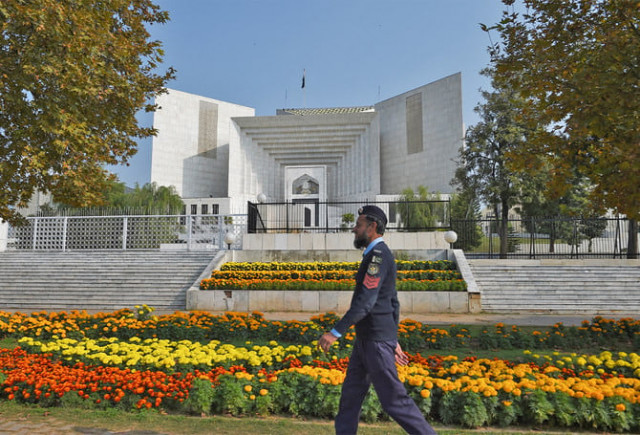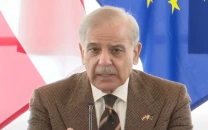PTI moves SC against Naqvi’s appointment
Files petition in LHC for holding Punjab PA elections no later than Apr 14

The Pakistan Tehreek-e-Insaf (PTI) on Friday filed a petition in the Supreme Court against the appointment of Mohsin Raza Naqvi as the caretaker chief minister of Punjab.
In it, Ahmed Nawaz Chaudhry stated: “The chief minister of Punjab be restrained in selecting/appointing any cabinet and/or he be restrained from performing any function vis-à-vis the issues of elections till the decision of the titled petition by this honourable August Court.”
The petition stated, “The appointment is in sheer abuse of the process of the Constitution.”
Sheikh Rashid also challenges appointment
Awami Muslim League (AML) chief Sheikh Rashid Ahmed also challenged the appointment of Naqvi as the caretaker Punjab CM.
The petition stated that Naqvi was “involved in a case of corruption and corrupt practices initiated by the National Accountability Bureau (NAB) where he struck a plea bargain/voluntary return under Section 25 of NAO 1999 and thus is a convicted person”.
He added, “Naqvi was not eligible to be appointed as a caretaker chief minister and thus he has no lawful authority to continue in the office.
“The Honourable Supreme Court of Pakistan in a suo motu case no 17/2016 has held that once a person is accused of corruption or corrupt practices, volunteers to offer to return the amount he has pocketed or gained through illegal means cannot hold any government/public office.”
Earlier this week, the Election Commission of Pakistan had appointed Naqvi as the caretaker chief minister for a 90-day interim period – a decision that drew vehement criticism from the PTI and its key ally the PML-Q who had already forewarned that any "controversial" appointment would be challenged in the court.
Naqvi’s name was agreed upon in an ECP meeting chaired by Chief Election Commissioner (CEC) Sikandar Sultan Raja and attended by four members of the commission, besides the ECP secretary and special secretary and ECP director general, law.
With the appointment, PTI Chairman Imran Khan had announced that the party would stage protests throughout the country against Naqvi’s appointment, calling the new appointee “an enemy of the PTI”.
“We will not accept a ‘corrupt’ person as an interim chief minister. We will hold a series of protests in all the cities of Pakistan,” the PTI chief had said.
Workers and supporters of the PTI, responding to the call of their leader, staged protests outside the ECP office to denounce its decision.
LHC moved for Punjab election
The PTI also filed a petition in the Lahore High Court seeking direction for Punjab Governor Balighur Rehman to immediately announce the date for holding the provincial assembly election within 90 days of its dissolution.
The 17th Punjab Assembly was dissolved on Jan 14, and according to the Constitution, the province is to elect a new legislature, no later than Apr 14.
The petitioner, PTI's Secretary General Asad Umar, filed a petition through Barrister Ali Zafar contending that the Punjab governor had been impleaded through the principal secretary as a respondent as Article 105(3) of the Constitution, 1973 required him to appoint a date for holding the provincial assembly election not later than 90 days of its dissolution but he failed to discharge his constitutional duty.
Read PPP, PML-N to jointly contest elections in Sindh
Barrister Zafar implored in the petition that on January 12, 2023 the then Punjab Chief Minister Pervaiz Elahi advised the governor to dissolve the assembly by exercising his constitutional powers under Article 112 of the Constitution. On Jan 14, 2023, pursuant to the Elahi’s advice in accordance with the terms of Article 112(1) of the Constitution, the assembly stood dissolved.
He contended that subsequently, the Punjab PA speaker through a letter on Jan 20, 2023 requested the respondent to fulfil his constitutional duties and immediately appoint a date not later than 90 days for the election of the assembly as required under Article 105 (3)(1)(a) read with Article 224 of the Constitution.
He stated that Sardar Usman Khan Buzdar, the parliamentary leader, conveyed the concern of not only the PTI but the people of Punjab and also requested the governor to appoint a date.
The Election Commission of Pakistan (ECP) is a body formed under Article 218 of the Constitution and mandated under Article 218(3) to organise and conduct elections and to make such arrangements as were necessary to ensure that the election was conducted honestly, justly, fairly and in accordance with the law.
The ECP, through a letter on Jan 24, 2023, also communicated its concern with respect to the inaction of the respondent in appointing a date for the election and required him to appoint a date between April 9, 2023 and April 13, 2023.
More than 10 days have passed since the provincial assembly was dissolved but the governor failed to fulfil his constitutional duty by not appointing a date of election. “It is the duty of and mandatory for the respondent to appoint the election date to maintain the continuity of the system, but he failed to perform his constitutional duty.
The inaction of the respondent to do the needful was “unlawful and unconstitutional”.
The failure of the respondent to appoint the election date was creating hurdles for the ECP to discharge its duties under Article 218(3) and the Elections Act and to organise the election within the stated period of 90 days.
The ECP in its letter already highlighted the concerns but the respondent remained unmoved.
The inaction of the respondent to appoint the election date was also frustrating the campaign plans of the candidates because of the uncertainty it engendered.
Unless the date of election was known, and, consequent thereupon, the ECP undertook the activities stipulated in Section 57 of the Elections Act, the election campaign could not take off.
“Every day’s delay in the announcement of the election date is eating into the time available for the election campaign. This is completely against the scheme of the Constitution and the law.”
The respondent was depriving the petitioner of the fundamental right guaranteed under Article 17 of the Constitution, which, according to the law declared by the August Supreme Court, includes the right of a political party to contest and participate in the elections. “Unless the date of the election is announced, the exercise of this right will be frustrated.”


















COMMENTS
Comments are moderated and generally will be posted if they are on-topic and not abusive.
For more information, please see our Comments FAQ